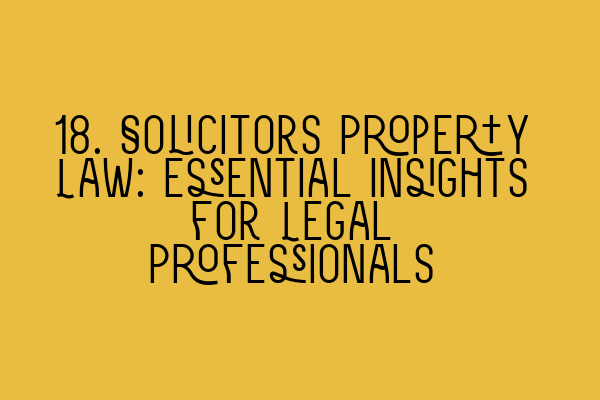18. Solicitors Property Law: Essential Insights for Legal Professionals
As a legal professional, having a solid understanding of property law is essential for providing comprehensive legal services to your clients. Property law encompasses a wide range of legal issues related to the ownership, transfer, and use of real estate. Whether you are a solicitor specializing in residential or commercial property, this article will provide you with essential insights to navigate the complexities of property law.
1. Understanding the Basics
Property law governs the legal rights and obligations surrounding any form of real property, including land, buildings, and other structures. It involves a wide range of legal principles, such as ownership, possession, tenancy, and conveyancing. Understanding the basic concepts of property law is crucial to effectively representing your clients.
To gain a solid foundation in property law, consider enrolling in SQE 1 preparation courses. These courses cover all the necessary subjects for the SQE 1 exam, including property law. By familiarizing yourself with the exam syllabus, you can ensure you have a comprehensive understanding of the subject matter.
2. Conveyancing Process
One of the key aspects of property law is the conveyancing process, which deals with the transfer of property from one party to another. Whether your client is buying or selling a property, it’s important to guide them through each step of the conveyancing process.
Start by conducting thorough due diligence on the property. This involves reviewing title deeds, land registry records, and conducting searches to uncover any potential legal issues or restrictions. By identifying any potential problems early on, you can help your client avoid costly legal disputes in the future.
Once due diligence is complete, it’s time to draft the necessary legal documents, such as contracts, transfer deeds, and mortgage agreements. Ensure that these documents accurately reflect the intentions of your client and protect their legal interests. Consider utilizing SQE 1 practice mock exams to enhance your drafting skills and ensure that your legal documents are of the highest quality.
Finally, guide your client through the completion and post-completion stages of the conveyancing process. This includes exchanging contracts, transferring funds, registering the property with the land registry, and dealing with any post-completion matters. SQE 1 practice exam questions can help you stay up to date with the latest conveyancing procedures and requirements.
3. Dealing with Leasehold Properties
Leasehold properties are a common subject of property law, particularly in the context of residential properties. Understanding the intricacies of leasehold agreements, service charges, and lease extensions is crucial for providing accurate and informed advice to your clients.
When dealing with leasehold properties, pay attention to lease length and ground rent terms. Ensure that your clients are aware of their rights and obligations as leaseholders, including any restrictions on alterations, subletting, or use of the property. Additionally, guide your clients through the process of extending their lease, if necessary, to protect their long-term interests.
Stay updated with recent developments in leasehold law by regularly reviewing the SRA SQE exam dates. These exams provide valuable insights into current legal trends and can help you stay one step ahead in your practice.
4. Commercial Property Considerations
Commercial property transactions present unique challenges that require specialized knowledge. When representing clients in commercial property matters, it’s essential to consider factors such as zoning, planning permissions, environmental regulations, and business rates.
Advise your clients on the implications of entering into commercial leases or purchasing commercial properties. Familiarize yourself with the key provisions of commercial lease agreements, such as rent review clauses, repair obligations, and break clauses. Additionally, ensure that your clients understand their obligations under commercial tenancy legislation and other relevant regulations.
If you are looking to enhance your expertise in commercial property matters, consider enrolling in SQE 2 preparation courses. These courses focus on practical skills and knowledge required for the qualifying work experience (QWE) stage of the SQE assessments.
5. Additional Considerations
While this article provides a broad overview of property law, there are numerous additional considerations that may arise in your practice. These may include boundary disputes, rights of way, easements, restrictive covenants, and property finance.
To stay updated with the latest developments and gain further insights, continue educating yourself through professional development courses and industry events. Keep an eye on SQE 1 preparation courses that cover advanced property law topics to deepen your understanding and stay ahead in your professional journey.
Conclusion
Property law is a complex and multifaceted area of legal practice. By gaining a comprehensive understanding of property law principles, staying updated on the latest legal developments, and utilizing resources such as SQE 1 practice exam questions and SQE 2 preparation courses, you can provide exceptional legal services to your clients in property-related matters.
Remember, property law is constantly evolving, and staying ahead requires continuous learning and adaptation. At SQE Property Law & Land Law, we are committed to supporting legal professionals in their journey towards excellence. Explore our range of SQE preparation courses and stay on top of your game in property law!
References:
– SQE 1 Practice Exam Questions
– SQE 1 Practice Mocks FLK1 FLK2
– SQE 2 Preparation Courses
– SQE 1 Preparation Courses
– SRA SQE Exam Dates
